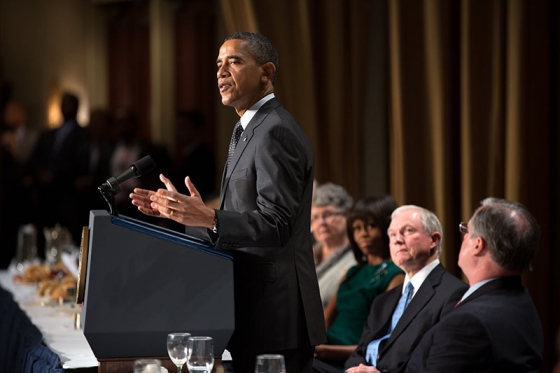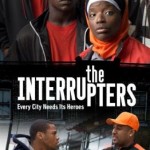We run our website the way we wished the whole internet worked: we provide high quality original content with no ads. We are funded solely by your direct support. Please consider supporting this project.

Thank You Obama for Denouncing “Christian” Violence: It is Actually Far Worse Than ISIS
Picture Credit: Official White House Photo by Pete Souza
It seems some conservative Christians are up in arms because of something Obama said at the National Prayer Breakfast yesterday. After condemning ISIS and religiously-motivated violence in general, the president added:
Lest we get on our high horse and think this is unique to some other place, remember that during the Crusades and the Inquisition, people committed terrible deeds in the name of Christ.
How could that possibly be controversial, you ask? Well, according to the Catholic League’s Bill Donohue, it was “an attempt to deflect guilt from Muslim madmen.” He went on to argue that Christian crusaders were merely defending themselves against hostile Muslim neighbors. Conservative commentator Michelle Malkin Tweeted, “ISIS chops off heads, incinerates hostages, kills gays, enslaves girls. Obama: Blame the Crusades.” And there are a host of others expressing their anger over Obama’s comment in various social media venues as well.
Several points. First, Obama didn’t blame the Crusades for what ISIS does. He was simply noting that religious violence isn’t restricted to über-radical Muslims, and he was right to do so.
Second, the crusaders were most definitely not merely “defending themselves against hostile Muslims!” There is a reason why they were called “crusaders” rather than “defenders.” They traveled from Europe down to the Holy Land because they wanted to take it from the Muslims. And as Muslims and “Christians” fought over this land for the next two centuries, “Christians” were at least half the time aggressors.
Third, the crusaders were sometimes just as vicious as Isis. One account I read reported that the crusaders celebrated a particular victory over their Muslim adversaries by throwing their babies in the air to impale them on their swords!
Fourth, the Inquisition was even worse than the Crusades. “Christians” in the Middle Ages developed ingenious ways of torturing people. Hundreds of thousands of Jews, witches, heretics, and rank and file sinners were tortured and murdered in ways that would make ISIS warriors green with envy. (If you have the stomach for it, check out this.)
Finally, and most importantly, why on earth would any follower of Jesus want to minimize or defend the atrocities committed in the name of Christ? I rather think we have an obligation to denounce it in the strongest terms possible, for this violence completely contradicts everything Jesus stood for and died for. Insofar as people tortured and killed in the name of Jesus, they have no more in common with the real Jesus and the real kingdom he inaugurated than ISIS does, and, for the sake of Christ, his followers need to declare this.
In fact, for followers of Jesus, the violence perpetrated by “Christians” throughout history ought to be considered far worse than the violence perpetrated by ISIS or any other religious group throughout history, precisely because this violence was done in the name of Jesus. Whereas other forms of religious violence harm people, Christian violence also brought – and still brings – tremendous harm to the kingdom of God. While the church is supposed to attract people to Christ by the beauty of our Jesus-imitating self-sacrificial love, violence in Jesus’ name drives people away and justifies their hatred and unbelief.
For this reason, violence done in Jesus’ name must be considered by Jesus followers to be the most demonic form of violence there is. As demonic as the violence being carried out by ISIS is, “Christian” violence is much more so.
So thank you President Obama for including Christian violence in your denunciation of religious violence—though you could have worded it much more strongly!
Category: General
Tags: Crusades, ISIS, Non-Violence, Obama, The Inquisition, Violence
Related Reading

Blessed are the Peacemakers
We recently watched a show on Frontline (PBS) called The Interrupters. This two hour long documentary follows several “Interrupters” as they attempt to peacefully resolve conflict in their oftentimes violent neighborhoods in Chicago. The group of Interrupters is a mix of the young and the not-so-young, women and men, single and married. They represent multiple…

Sermon Clip: How Christians Should Respond to Ferguson
In this clip from this weeks sermon, Greg Boyd comments on how Christians should respond to the events in Ferguson St. Louis and how that response should always be in love and to help heal both sides. The full sermon is here: http://whchurch.org/sermons-media/sermon/heart-smart-qa

Frank Viola’s Interview With Greg: OT Violence and the Spirit World
I have not yet personally met Frank Viola, but over the last several years we’ve conversed and debated a good deal, to the point that I consider him a good friend. He is one of those all-too-rare types of people who is solidly grounded in the Word and yet who is not enslaved to traditional…

What About Jesus’ Violent Parables? A Response to Paul Copan (#7)
Copan’s Argument. In Crucifixion of the Warrior God (CWG) and Cross Vision (CV) I argue that the violent depictions of God in the OT are incompatible with the non-violent, self-sacrificial, enemy-embracing God who is fully revealed in the crucified Christ. It’s my contention that we therefore need to interpret these violent divine portraits, as well…

God’s Warriors
Greg’s ideas on faith and politics were featured in the Peabody Award-winning CNN Presents: God’s Warriors. Watch the full video below. For more information, including behind the scenes footage, visit God’s Warriors – Special Reports from CNN.com.

The Cruciform Way of the Lamb
In this video, Greg offers insight into how to read the Bible with the cross at the center of the revelation of God, thereby reframing how we interpret the violent and nationalistic passages of the Old Testament. Travis Reed from The Work of the People did a series of interviews with Greg a while ago and…
